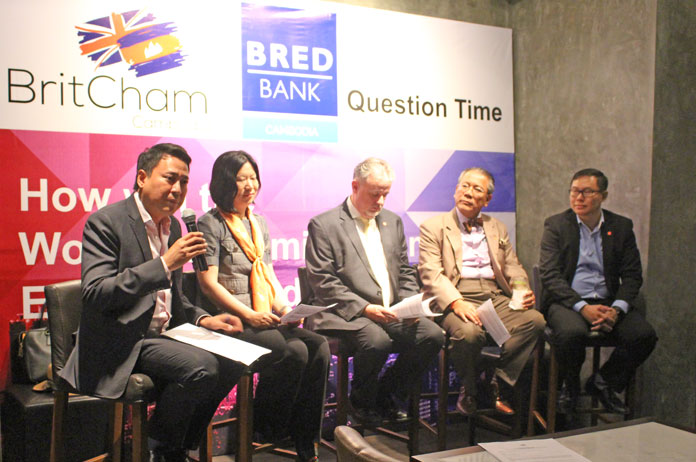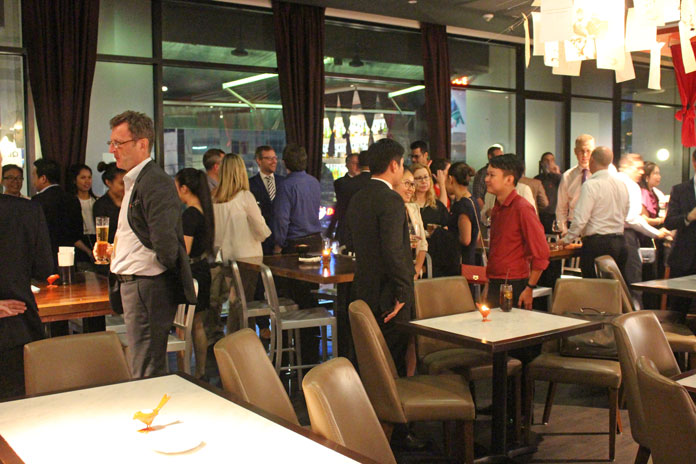World Economic Forum On ASEAN Comes Into Focus

Sim Sokheng, the director-general for International Trade at the Ministry of Commerce, revealed last, Tuesday that discussions on trade and industrial development will be at the top of Cambodia’s agenda during the World Economic Forum (WEF) on ASEAN, which is being hosted in Phnom Penh from May 10-12.
Sokheng – one of the main architects of trade integration strategy for 2014-2018 – said the government aims to diversify the country’s industrial capacity, now disproportionately centred around the production of garments and footwear, to climb up the global value chain, but stressed the importance of continuing to nurture the garment industry. “We want to attract more light industry that generates higher value. However, we can’t forget about garment manufacturing, which remains the country’s biggest employer. We need to add value to this industry,” he said Sokheng was speaking at an interactive panel discussion organised by the British Chamber of Commerce (BritCham) held at Phnom Penh’s Metro Mara restaurant. The event brought together members of the private and public sectors, and gave attendants the opportunity to ask questions to policymakers and economic experts on the occasion of the fast-approaching WEF on ASEAN.
Industrial development and trade
Sara Zhou, resident representative of the IMF’s Cambodian office, echoed Sokheng’s concerns regarding the country’s current industrial capacity. She reiterated the importance of upgrading the country’s garment factories. “Garments is right now a very competitive industry, with a lot of low-cost producers entering the market. If we don’t improve, we might lose our edge,” she said. The IMF representative noted that, despite challenges brought about by heightened competition, the opportunities for the Kingdom in the current conjuncture are manifold.
They include many doors opened by integration in the Asean Economic Community (AEC), as well as the relocation of labour-intensive manufacturing firms from China to Southeast Asia. According to Zhou, to be able to capitalise on these opportunities, the country needs to deal with some fundamental issues that are keeping investors away: the high cost associated with electricity and the lack of infrastructure. Cambodia needs to tackle these issues fast, and prepare for a future in which it might not enjoy some of the current advantageous trade agreements, she said. “As we grow and develop, we might lose the preferential trade treatment that we enjoy with the US and the European Union. We need to prepare for this. We need to have a sense of urgency, and ask ourselves: ‘what can we do better?’,” added Zhou.
According to IMF figures, garment trade remains the key driver in export growth, and will continue to dominate in the medium term. “Unless the IDP [industrial development policy] is implemented fast, there won’t be any dramatic changes in the next five years, and garments will continue to dominate [exports],” said Zhou. Addressing Zhou’s comments on the elevated cost of power in the Kingdom, Sok Siphana, principal at law firm Sok Siphana & Associates, said that China has already invested $2.3 billion in hydropower facilities, which by 2028 will significantly reduce the price of electricity and attract investors.

Human resources and youth
Pierre Tami, a renowned social entrepreneur and the founder of the Academy of Culinary Arts Cambodia, said that education will take centre stage during the forum. Improving the education system is essential to guarantee decent employment to the younger generations, he said. “We have 300,000 new people landing on the job market every year. How can we help them? It’s a huge challenge,” he said.
Tami discussed Cambodia’s low competitiveness by referring to it’s poor ranking in the Global Competitiveness Report, a cross-country study conducted by the WEF that analysed the factors and institutions determining long-term growth and prosperity. This year, Cambodia takes 89th spot, making it the second least competitive country in the region, ahead of only Laos, who holds the 93rd position. To tackle this issue, the public and the private sector need to come together, says Tami. “It’s time to stop passing the blame around. The government and the business community need to sit down at the table and discuss. We need to fight at the table,” he declared.
The WEF on ASEAN will bring together senior decision-makers from across the region to examine the most pressing policy issues faced by the ten member states, including industrial development, cross-border trade and education. Discussions during the forum will be based on three main pillars. The first one, “ASEAN in the new global context”, will consider the direction the organisation should take given the latest shifts in global dynamics. “Connectivity” will explore the Fourth Industrial Revolution and how it can connect people and companies, as well as the infrastructure needed to further development in the region. Lastly, “Youth” will look into education, competitiveness and the skills gap, among other issues.